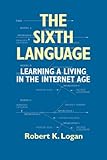The Sixth Language: Learning a Living in the Internet Age, Second Edition
The Sixth Language: Learning a Living in the Internet Age, Second Edition

This second edition includes 37 new pages in a new Foreword and Afterword where Logan reports on a number of new developments in his research into the origin and evolution of language. The first edition of the Sixth Language was a recipient of the Susanne K. Langer Prize of the Media Ecology Association for Outstanding Scholarship in the Ecology of Symbolic Form.
The Sixth Language updates the work of Marshall McLuhan by applying his ideas to the communications revolution taking place due to digital information technology. Logan's work interweaves ideas which touch on language, education, work, social class, information technology and management theory. He establishes the theoretical background for his study with a succinct and very readable summary of McLuhan's ideas.
Logan develops a new theory of language by showing that a language is not merely a system of communication but also an information processing tool. He goes on to show that speech, writing, mathematics, science, computing and the Internet form an evolutionary chain of verbal languages. A new language evolved each time the informatic capacity of the previous set of languages was exhausted. Math and writing arose to deal with the information overload associated with economic transactions of the agriculture based city states of Sumer.
The schools that evolved to teach the new math and writing skills gave rise to scholarship and a new form of information overload ensued. Science or organized knowledge arose to deal with the new information glut created by the teachers in the newly established schools. Computing developed out of the need to cope with the information overload created by science and the Internet was the response to the info overload and need for greater connectivity of computing.
As Logan weaves his tale of the development of language he also shows how new educational, social, political and economic institutions arise. He then develops a theory of social class based on the notion that agriculture created the aristocratic class; and literacy, the middle class. He then speculates as to whether computers will give rise to a new social class - computerate class.
Turning to education Logan shows how the evolution of language led to the evolution of education. He explains that the reason our schools are so out of touch is that they are Industrial Age institutions trying desperately to meet the needs of the Internet Age and the Knowledge Era. He suggests a radical new way of remedying the malaise of education by proposing that the core curriculum focus on the generic skills associated with the use of the six languages of speech, writing, math, science, computing and the Internet. He contends that the actual content of the curriculum, the topics that are studied are not important and should be chosen to cater to the students' interests. Once students have mastered the six languages they are then in a position to learn whatever topics or material they require for their work or their personal interest.
Logan proposes an equally radical rethinking of training and education in the work place. He shows how information technology has completely changed the way in which we work and learn; and more importantly, he exposes how the relationship between work and learning has also changed. He explains that one can no longer earn a living by putting in time; but instead, one must now "learn a living'. The only form of job security is life long learning and a set of up-to-date skills that are in demand. His call for life long learning re-echoes the theme of McLuhan's earlier work and that of today's business management literature.
Logan closes his book with a chapter on the Internet in which he shows how this medium recaptures the spirit of oral culture. He demonstrates that the new level of connectivity requires more than the mere re-engineering of business processes such as marketing, advertising, sales, customer support, and market research. According
List Price: $ 32.95
Price: $ 27.94
Find More Internet Products
No comments:
Post a Comment